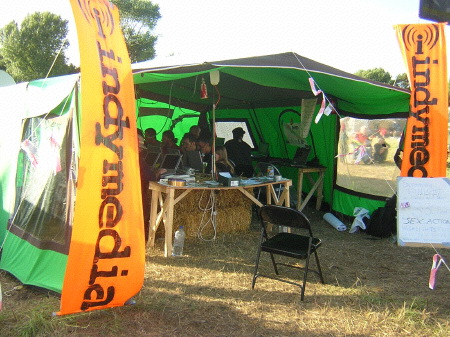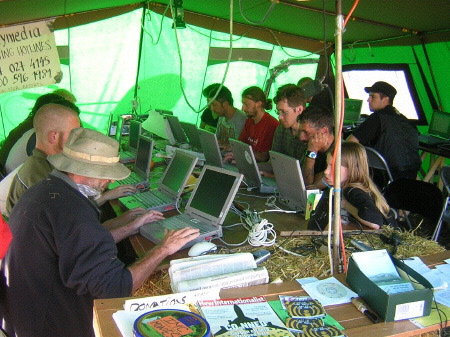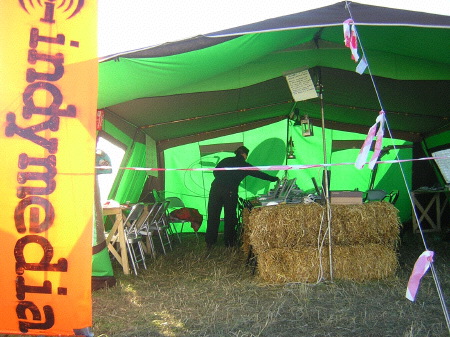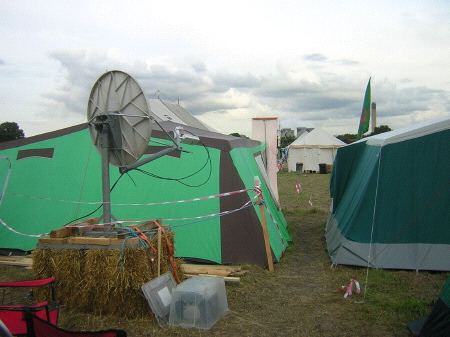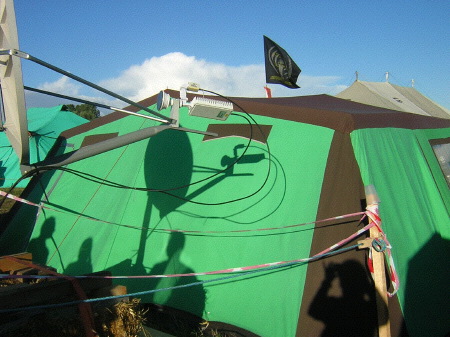Indymedia at the Camp for Climate Action 2006: Report & Personal View
IMCistas | 02.10.2006 18:12 | Climate Camp 2006 | Climate Chaos | Ecology | Indymedia | Technology
During the Climate Camp, the field IMC media centre was open for a minimum of five hours each day (two and a half each morning and evening), with these limited opening hours primarily aimed to conserve power. Some days it was open longer, and it ran fully all day for two days until about midnight during the main day of action.
Mostly the imc ran on bio-diesel, but there was also a renewables power feed and some battery capacity. Twelve P1 laptops running via an LTSP server from Bristol Wireless provided the core public access, plus varying at different times up to five more modern laptops were running.
Two tents provided the main structures, one for the main imc / Public Access Point and one more as storage and kitchen. Chairs came from a social centre in Manchester, and table tops were donated by TRIM timber recycling of Manchester. 6 tables were set up balanced on top of hay bales (looking very rustic) while another 6 table tops had very sturdy legs masterfully constructed from scrap timber. The satellite dish providing connectivity from Psand was similarly balanced on top of four hay bales, but was in fact rock solid once ratcheted down - again a nice mix of rustic charm with hi tech.
Around 145 pictures were published direct from the field IMC, including two mobile phone pics (non-automated). Dispatch had over 50 phone reports on the main day of action. Several audio interviews and video clips were published. One freelance videographer was arrested and had their footage seized by cops. There was lots of good filming going on, and on the Friday night, over one hour of rushes were screened in two different tents to an appreciative audience! Several different sections of these are now fully published in IMC UK's Climate Camp page.
A big well done to all involved in setting up, running, participating and taking down the centre!
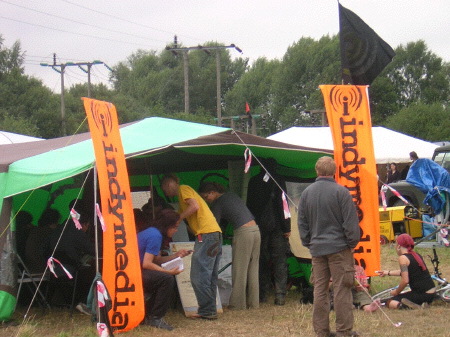
Front view of the IMC Public Access Point
A personal view:
"No, Sorry, We Don't Have a Phone Charger".
I'm not sure how many times I said that whilst volunteering at the Indymedia Public Access Point, set up at the Camp for Climate Action near Selby (Yorkshire) but it must have been, at least, about five to ten times a day, every day, or at least this is how it feels. My answer would almost always be followed by a mixed reaction of surprise, shock or even incredulity: "Really!? ... you don't?!.. how come? .. I though Indymedia would have that."
To tell you the truth the first time I got this sort of reply I though it was someone being funny (or at least trying to be) As a matter of fact, at first, I actually found it quite amusing. But soon I realised that quite a few people were serious about this. Ha!, yes, at some point someone stormed out of the Indymedia tent after I told him we didn't have an available Nokia charger for his phone, but that if he looked for one himself he would be able to plug it into any spare socket at the IMC tent. "Where?!" he nervously shouted back at me. "Well maybe in your barrio, or affinity group??" I responded trying not to show my amusement. He then blasted back, "well fuck ... I got an action to do tomorrow early morning and I need my phone to wake me up, don't I!". By this point I was having serious trouble trying not to burst into laughter, but then, luckily enough, our man on the decks (i.e.: mr. cider-satellite dish man :) shouted from the back: "look mate, why don't you get one of your mates to wake you up init?!". Init indeed!
So it seems that apart from ensuring the Camp was electronically connected to the outside world by providing satellite internet connection, and a fully functioning media centre in a middle of a field powered by renewables - big, big up to the Bristol Wireless crew who helped set up, and the amazing folk from Psand.net that brought most of the necessary kit, including a satellite dish, a server, 12 networked laptops for public use, a very cosy caravan and a vast amount of West Country cider! - apparently we should also have had a box full of all sorts of chargers hoping that no one oversleeps their action. Well, sorry, we presumed people would take care of their own personal kit.
Sure, Indymedia had enough spare plugs to let people share the energy available so to charge phones and cameras, after all these are needed if people are going to be reporting from the actions, thus many mobiles and batteries were charged at the Public Access Point throughout the week. But going as far as demanding that Indymedia keep personal electronic devices going, or to expect that the few volunteers running the media centre should also be made responsible for looking after other peoples batteries, photo cameras, video cameras, mobile phones and laptops whilst left charging, it seems incredible to me.
What's next then? Shall Indymedia also makes sure to bring enough credit for mobile phones in the future should people run out of calling time?
More than six years after the birth of Indymedia, it seems obvious to me that the main reason why IMC-UK would set up shop at the Climate Camp was not to merely offer enough plugs for people's mobiles, batteries, and other devices, but to provide internet connectivity, to set and run a 'media centre' open to all, where people can do their own media. To facilitate people to communicate with the wider world about the issues being discussed at the workshops, to make sure the stories of the day of action were not lied about by journos popping out from the sidelines, or by editors with clear corporate agendas. Instead to allow the protagonists themselves to tell their stories, in a direct, participatory and democratic way. This is what Indymedia is here for, and this is why Indy folk have been putting so much time and effort into building up this network.
But once again, I find myself repeating all this. Basically because from where many IMC volunteers are sitting, it increasingly feels that Indymedia is taken for granted, with the danger of widely be seen as a sort of 'service provider' for the 'movement'. At times, it feels as if an increasing number of people would see Indymedia as a separate 'institution' that "has lots of computers, cameras, kit of all sorts, and 'alternative journos' that work for the movement".
Well, no. Not at all. Indymedia is a fluid mix of politics, technology and media. It is a web of politically active networks, collectives and individuals that come together to maintain numerous projects, which in turn, aim to build up physical and electronic horizontal spaces for co-operation, exchange and participation, in other words, grass-roots autonomy. Indymedia is an intrinsic part of the 'movements', it is so as much as a social centre, a direct action group, a campaign or an action camp may be. Indymedia is not detached from it all, and it only makes sense if it is understood as such. Doing Indymedia is as much an 'action' in itself as blockading the entrance of Hartlepool nuclear power station or breaking into Drax perimeter fence. It is no different from running a workshop or forming an affinity group. The same as keeping a kitchen going, facilitating a meeting, providing medic assistance, well being support or cleaning the compost loos at the camp, Indymedia relies on volunteers to do it.
Indymedia is here, it is a reality that, despite its flaws, works. But only if people make it their own. In other words, Indymedia can only be a working alternative to corporate and mainstream media if the 'movements' (in its wide sense) actively participate in the project. Be the Media! says the old slogan. Today you do an action, tomorrow you click the publish button on top of the newswire and tell people about it first-hand. Or the opposite, today you publish in Indymedia so tomorrow the context and the arguments of your action, campaign or project are much clearer to everyone else 'out there'.
Even though an Indymedia Public Access Point is effectively and conceptually very different to what an internet cafe may be, still, there was nothing stopping people from using an IMC laptop to check personal email accounts, or to buy a bus ticket to get back home if needed. But primarily they were provided so people could report on whatever they were involved with: the actions, the amazing array of workshops that took place, the barrios, the kitchens, and the issues behind it all, so the message can come out there loud and clear, and as unmediated and unfiltered as possible. Sure, some people did just that, and thus the reporting from the whole week of events went online as it happened, with texts, photos, audio and video.
But they were not enough. The public access computers would always be busy with someone hitting the keyboards, but the written reports, photos, audio and videos of the unfolding events seemed to rely on a very few dedicated people. In my opinion it would be fair to say that around 90% of the media coming from the Camp into Indymedia, would have still been published in real time had it been left to just a few IMCistas working in a much smaller and closed operation. And this is a problem, especially if it is true that we (as a 'movement') acknowledge and understand the need for having our own independent media and autonomous networks of communication.
In 1996 the Zapatistas already called for "the creation of a network of independent media, a network of information. A network to resist the power of the lie that sells us this war that we call the Fourth World War. We need this network not only as a tool for our social movements, but for our lives: this is a project of life, of humanity, humanity which has a right to critical and truthful information" [full communiqué]
Not long after, in 1999, the first Indymedia website blasted out of the net, from the streets of Seattle, into people's consciousness during the anti-WTO protests. A few months later IMC crossed the Atlantic and popped up in London's Parliament Square during MayDay 2000. Since then Indymedia has not only been present and actively participating in every single major mobilisation around the world, but nodes have also sprung up in every corner of the globe, with now over 160 autonomous IMC websites that dedicate the time in between spectacular global days of action, to help build up and sustain 'our own media'. But although the 'movement of movements' seem to rely on, or at least make wide use of, these open channels of horizontal communication (whilst often claiming that these are an essential part of the 'struggles'), there still seems to be the need to emphasise its horizontal, collective and participatory nature (i.e.: 'Your Own Media") After 6 years of Indymedia activity (both in its electronic as well as physical forms) we still often find that it seems not able to escape the narrow and exclusive notions of 'the professional' or 'the specialist', within which capitalism continuously tries to confine people into (i.e.: the tech, the writer, the photographer, the videographer ... the one with the latest laptop or streaming device, and so on) Well, no. It is not like that. Nor does Indymedia attempt to mediate between the 'activist' and the 'sympathetic audience out there'. Rather it offers a web of electronic and often physical spaces for people to tell their own story, thus by-passing corporate media, or to put differently, before the 'Daily Mails' of this world do it for us.
So then, given this scenario, it is not a big surprise (albeit highly objectionable in my view) that, for example, the introduction article of the otherwise excellent book Shut Them Down! mentions Indymedia as an example of something that it is not an "innovation from previous campaigns and struggles", and therefore nothing is written in the book about Indymedia's participation in the anti-G8 mobilisations in Scotland in July 2005. The book's introduction article (signed by the The Editors) briefly refers to IMC by stating: "Indymedia is now fairly well established (since Seattle, in fact), so we have included nothing of the role they played either". Well, in my opinion this statement is mistaken in, at least, two counts:
First in referring to Indymedia as "they". Which "they"? Doesn't this imply the idea of some sort of established 'professional body' that, because of its 'success' and 'acceptability', it has somehow started to grow out of the grass-roots and moved into some space above and beyond the active components of this 'movement'. Almost as if its existence was now rooted in some sort of higher 'activist establishment'. Yes, true, it has been here for a while, it has been fulfilling a clear task - or at least trying very hard to do so, it hasn't broken into pieces yet, and it is still going strong - not without any problems or contradictions of course. But does this really mean (or imply) that because of this 'success', it has now become a sort of monolithic structure detached from the 'new and exciting innovations or tactics' the book wants to focus on? Well, I personally don't think so. There may be shortcomings within IMC, of course there are, as well as the need to embrace and reflect the evolving nature of the so called 'social movements', the internet itself, and society in general, true. But this is part and parcel of being engaged in a continuous process, that is fluid and never stays still for too long, and that it continuously needs to adapt to different situations and new contexts. It is therefore, up to the 'movements' to make sure IMC keeps its relevance, and stays in tune with these exciting "innovations' the editors of Shut them Down! refer.
Second. It clearly seems to miss the point (or be aware of) what Indymedia actually did and contributed to the anti-G8 mobilisations. Amidst the mainstream media hype and the frenzied celebrity reform-a-thon that was Live8 and the Make Poverty History campaign, Indymedia was the only place where you could read the stories of the various mobilisations and the politics behind them (see G8 2005 feature pages 1 | 2 | 3 | 4). Ok, it is true that Indymedia used computers, cables, cameras and electronic gadgets of all sorts to primarily produce 'our alternative and independent media'. In this sense, and in a very basic level, we could say that the Indymedia set up was quite traditional. I mean, IMCistas didn't use computers to build barricades so to block the M9 for example, nor was kit was painted with funny colours so to try to 'break down an established set of personal interactions and social relations' that others seem to have attempted . But in fact, it actually tried to do just that by creating the biggest field Indymedia centre that has ever been set up for any European mass mobilisation, or at very least, it was certainly the first time that it was done on such a large scale here in the UK. It is therefore fair to say that the IMC set up in Scotland was the most daring, resourceful and innovative that we have seen in Britain so far. The Indymedia 'operation' in Scotland not only consisted of a massive media centre in downtown Edinburgh with tens of computer terminals open to public access, with spaces dedicated to video and photo production, and an area committed to radio production composed of a wide Coalition of Radical Radio projects, but people also set up the smaller media centres, in Glasgow and the other in the HoriZone action camp near Stirling as mentioned above.
On the other hand, Indymedia also played with innovative satellite and wireless technology to make sure 'our media' was not only produced in real time and it stayed relevant to the messages and aims of the protests, but also, because of it very existence and way of functioning, it reflected the direct, open and participatory ethos of the so called 'movement of movements'. Yes, all in all, the Indymedia operation in Scotland was an "innovation from previous campaigns and struggles", at least in its organisational, tactical and logistical senses and size here in the UK. Indymedia didn't simply set up enough computers so people protesting had 'access to the internet' wherever they were. But the same as in the Camp for Climate Action, it actively participated in the protests by building a living and working alternative to mainstream and corporate media production. In this sense, it is not different at all to any other attempt to render visible 'the other kind of world we want to build', or, moreover, the one we want to experience right here, and right now. It is basically another way of engaging in 'direct action' together with, and alongside, many other tactics and strategies.
So anyway, and coming back to a field near Selby after a detour around central Scotland. People should stop looking at IMC volunteers as some sort of 'alternative journalists' ready to tap into a cool story, and see them as media activists. As people that focus their efforts into having our (a big 'our' that is!) own networks of communication. People that see it as essential as having, for example, our autonomous physical spaces and active networks. In any case, and by the way, IMC folk, the same as everyone else, also get stop and searched, beaten or arrested when in the streets. So, a big shout to all of those that participated and used the Public Access Point at the Camp for something more than just recreational web browsing, email checking, or battery charging. They made this possible.
Also a big up is due to all those involved in the running of the camp, and in the process towards it. There are many amazing things that happened that week in and around Drax power station, too many to list them in here. The Camp was a beautiful and powerful experience for all of us in the fields around Selby. As many have said it before, "something with new energy may be brewing up in the UK". Let's hope so. And if nothing else, the Camp, in its totality, showed that a more participatory and sustainable set of social relations and way of living is a possibility.
But remember, this time, and for once, the 'movement' struck lucky. Mainstream media picked up the story in a generally positive way, both because of the spectacular action setting and the pressing nature of the issue itself, and importantly, because of the hard work from the Camp's press liaison team. But let's remember, this is not normally the case, is it? Do it Yourself the old saying goes, and that includes building our own autonomous communication networks, otherwise it will be left to the corporate media, and we all know what normally happens when they do it, don't we?
maqui - one @ IMC-UK
IMCistas
Additions
great report
03.10.2006 00:57
kriptick
Power Politics...
03.10.2006 03:16
Loads of important points in here, almost too many to unpack in one reading.
It strikes me we are all dealing with contradictions all the time. At the climate camp I thought power was a major issue. There should have been more in my point of view - more renewables in a better structured way. Fair enough people were trying to minimise power consumption, but if there's a next time for something similar then more effort needs to go into the power issue for sure. And a realistic appreciation of the needs to administer and share power to maximise whatever there is of the stuff should be central to creating or demonstrating alternative lifestyles.
I also think at the camp a brilliant opportunity was missed in terms of documenting the workshops content. Though this happens at many events. It would be nice to see a higher priority placed on asking workshop leaders to publish their content (speaker notes, presentations, or even a top ten URLs or reading list) and encouraging, where appropriate, workshop participants to write up the sessions. That's something many of us could encourage, and indeed something for event organisers to consider.
That said, there was a tension between publishing and not publishing. The strongly worded discouragement from taking people's pictures or recording without permission was in my opinion quite right, but there's always a balance to be struck. The site media policies were pretty good, and I think it was clear that the work put into liaison with the coporate press and allowing them onsite represents another further development from the Stirling experience. Some people will of course see this as going down the wrong road completely.
I guess at the camp too many people had too little time to achieve everything they wanted to. It's always going to be the same with such temporary large convergences. The rest of our lives however, is another question entirely...
Pete
As one of the editors of "Shut Them Down" I hold my hands up.
03.10.2006 13:33
The wider point we were making in the introduction though wasn't that Indymedia didn't play a valuable role but that the role played wasn't controversial. The other example of something we didn’t have an article on was legal monitoring and defense obviously something we think is vital but also something that is no longer controversial.
I do think you are right that people do take Indymedia for granted and to some extent see it as a service provider, although I was at the Climate Camp and I still had that sense of wonder and admiration when the satellite dish and Indymedia tent go up. I think it gets subsumed into a general sense of pride in the infrastructure our movements can provide, the speed with which things get created, etc.
I think your article touches on an important problem and perhaps a central contradiction in the Indymedia project (something we didn’t think of when putting the book together). There is a split between the open access nature of using the Indymedia tool and the specialized knowledge of those building those tools, setting up the networks of computers, satellite dishes at convergences, etc. It’s this contradiction that also contributes towards people treating Indymedia activists as service providers. If we’d received an article based on the issues of the post above I think we would have published it.
Shut them downer
 Homepage:
http://www.shutthemdown.org/
Homepage:
http://www.shutthemdown.org/
re shut them down bit + some thoughts
03.10.2006 17:49
I think in a way the editors got it right, that Indymedia, or indeed alternative media, in itself, was not an innovation (or as the above poster says, not exactly controversial) at the G8. It should also be pointed out that the article in the book about media that dealt with the media counter spin collective did start by namechecking schnews and indymedia etc and saying what vital and important role they play(ed), and even describing the creation of our own networks of media and communication as one of the key achievements of the last decade.
Then again, I'm not convinced that many of the strands covered by the book didn't fall into the same category of not being innovative per se. I mean blockading, cooking for hundreds of people, running info lines, street carnivals, international mobilising and so on are all nothing new. Though they may not have been done on such a large scale here for a while.
Anyway, perhaps it's interesting to look further at the area of media after both the G8 and the climate camp, as both events had indymedia and other alternative media activists working as well as people working on contacts with the corporate mainstream press.
It's interesting to note that Indymedia and similar projects started partly out of frustrations with not being able to agree strategies for dealing with the mainstream press in the run up to big demos. Part of the answer was to abondon this aim and go DIY. So it's a significant development that counter spin collectives worked alongside both the Dissent mobilisation and the Stirling eco-camp and here at the climate camp.
Of course not every situation is the same and what works for one may not work for another and different sensibilities may be required. Regarding Indymedia during the G8, millions of hits were racked up and several mainstream news websites and blogs linked directly to the Indymedia coverage. So here it's fair to say that through Indymedia we were both 'creating our news' as well as conveying it to the 'outside world'. At the climate camp however, Indymedia coverage wasn't referenced by any other mainstream news organisations and so perhaps was more 'internal' than at the G8.
And of course sometimes you wouldn't necessarily want the general public looking at Indymedia to get a neatly packaged campaign PR message.
Just something to think about!
communication is key

